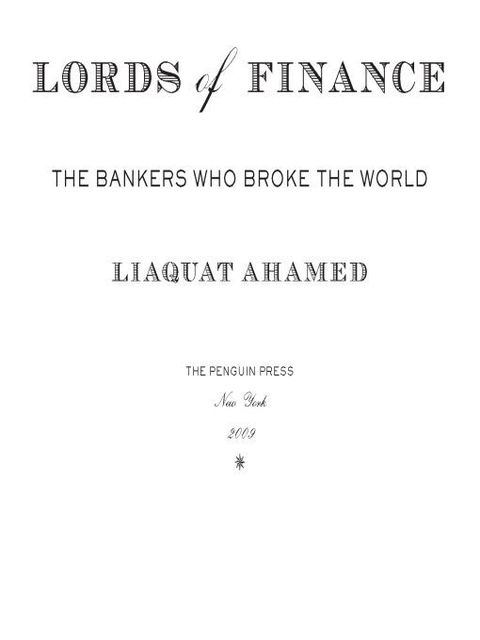
Read in our apps:
iOS
·Android
Lords of Finance
- Абулхаир Мухамбетиярhas quoted4 years agoWhen the First World War ended in 1918, among its innumerable casualties was the world’s financial system. During the latter half of the nineteenth century, an elaborate machinery of international credit, centered in London, had been built upon the foundations of the gold standard and brought with it a remarkable expansion of trade and prosperity across the globe. In 1919, that machinery lay in ruins. Britain, France, and Germany were close to bankruptcy, their economies saddled with debt, their populations impoverished by rising prices, their currencies collapsing. Only the United States had emerged from the war economically stronger.
- Абулхаир Мухамбетиярhas quoted4 years agoThe 1920s were an era, like today’s, when central bankers were invested with unusual power and extraordinary prestige. Four men in particular dominate this story: at the Bank of England was the neurotic and enigmatic Montagu Norman; at the Banque de France, Émile Moreau, xenophobic and suspicious; at the Reichsbank, the rigid and arrogant but also brilliant and cunning Hjalmar Schacht; and finally, at the Federal Reserve Bank of New York, Benjamin Strong, whose veneer of energy and drive masked a deeply wounded and overburdened man.
- Абулхаир Мухамбетиярhas quoted4 years agoBut a few lonely voices insisted that it was he and the policies he espoused, especially his rigid, almost theological, belief in the benefits of the gold standard, that were to blame for the economic catastrophe that was overtaking the West. One of them was that of John Maynard Keynes. Another was that of Winston Churchill. A few days before Norman left for Canada on his enforced holiday, Churchill, who had lost most of his savings in the Wall Street crash two years earlier, wrote from Biarritz to his friend and former secretary Eddie Marsh, “Everyone I meet seems vaguely alarmed that something terrible is going to happen financially. . . . I hope we shall hang Montagu Norman if it does. I will certainly turn King’s evidence against him.”
- Абулхаир Мухамбетиярhas quoted4 years agoAt times of crisis, central bankers generally believe that it is prudent to obey the admonition that mothers over the centuries have passed on to their children: “If you can’t say anything nice, don’t say anything at all.” It avoids the recurring dilemma that confronts financial officials dealing with a panic—they can be honest in their public statements and thereby feed the frenzy or they can try to be reassuring, which usually entails resorting to outright untruths. That a man in Norman’s position was willing to talk quite openly about the collapse of Western civilization signaled loud and clear that, in the face of the “economic blizzard,” monetary leaders were running out of ideas and ready to declare defeat.
- Абулхаир Мухамбетиярhas quoted4 years agoOver the previous decade, he and the heads of the three other major central banks had been part of what the newspapers had dubbed “the most exclusive club in the world.” Norman, Benjamin Strong of the New York Federal Reserve Bank, Hjalmar Schacht of the Reichsbank, and Émile Moreau of the Banque de France had formed a quartet of central bankers who had taken on the job of reconstructing the global financial machinery after the First World War.
fb2epub
Drag & drop your files
(not more than 5 at once)

